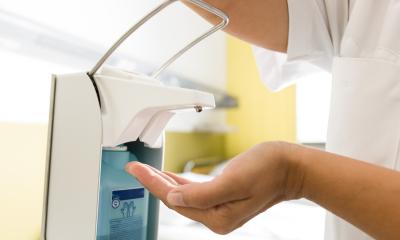
Image source: Adobe Stock/Rido
News • Lessons learned from the pandemic
Should mask rules remain in health care settings?
In a new commentary, public health experts from several prominent universities suggest that both patients and health care professionals should draw upon lessons learned during the Covid-19 pandemic and continue to mask up in the health care setting.
This is important because infection from Sars-CoV-2 is still a threat, especially to the most vulnerable patients, and masks are a proven method for preventing transmission. The commentary is published in Annals of Internal Medicine.
Although rates of severe Covid-19 have decreased because of increasing community immunity and access to medical countermeasures, severe outcomes attributable to Covid-19 are still occurring. Many health care workers and people in the general community no longer take the same precautions they did at the height of the pandemic and have returned to normal activities despite ongoing circulation of Sars-CoV-2 and other endemic respiratory viruses.
Authors from Public Health—Seattle & King County and the University of Washington advocate for updating approaches to masking in health care facilities to prioritize both patient and health care worker safety. They highlight that many patients in health care facilities are at higher risk of mortality and morbidity from Covid-19, and argue that facilities have a responsibility to promote widespread safety measures to limit the spread of hospital-acquired infections. They also argue that many health care workers still come into work with Covid-19, both symptomatic and asymptomatic. They note that pre-pandemic sick leave policies and more limited testing options make health care workers more likely to work while sick.
Finally, they argue that several policies could be implemented to improve patient and employee safety. They assert that masking could be implemented across health care spaces year-round; in targeted settings, such as transplant, oncology, and geriatric units; in specified months during the local respiratory viral season; or when community burden of respiratory viruses approaches a critical threshold.
Source: American College of Physicians
24.08.2023






